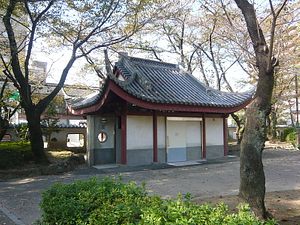A number of signs suggest that Japan and China are cautiously trying to improve relations.
Perhaps most notably, Hu Deping, the son of former reformist General Secretary of the CCP, Hu Yaobang, visited Tokyo earlier this month. Hu, who is a close confidant of Chinese President Xi Jinping, was in Japan from April 6 to April 14. The trip was organized by Japan’s Foreign Ministry and approved by the Chinese Communist Party.
During the trip, Hu was scheduled to meet with a number of Japanese officials including: Chief Cabinet Secretary Yoshihide Suga, Foreign Minister Fumio Kishida, former Prime Minister Yasuo Fukuda and Yohei Kono, a former speaker of the Lower House. Hu’s meeting with Kishida supposedly took place in the offices of Prime Minister Shinzo Abe; however, Prime Minister Abe was not expected to attend.
On Tuesday, though, Asahi Shimbun reported that Hu had secretly met with Prime Minister Abe himself during the trip. According to the report, Hu and Abe “talked about Tokyo’s stance toward Beijing, and discussed the future of Japan-China relations. During the meeting, Abe is believed to have told Hu that Tokyo is ready to hold dialogue and make efforts to mend bilateral relations.” The report went on to say that the CCP had approved the meeting because of its apparent desire to improve relations with Japan before it hosts the Asia-Pacific Economic Cooperation forum in Beijing in November of this year.
Similarly, earlier this month former Japanese Prime Minister Fukuda attended the Boao Forum in southern China. Fukuda is the chairman of the board of the Boao and played an integral part in starting the forum. Both Fukuda and Chinese Primer Li Keqiang attended and addressed the opening ceremony of the Boao Forum. Chinese State Councilors Yang Jing and Yang Jiechi were also present at the opening ceremony. There were no reports about whether Fukuda met personally with any of these Chinese leaders although he did hold a brief meeting with President Xi on the sidelines of the Boao Forum last year. The fact that there were no reported meetings between Fukuda and Chinese officials this time around could be interpreted as a positive sign, as it means they might have discussed more sensitive issues.
Then, on Tuesday, Chinese Vice Premier Wang Yang met with a Japanese business delegation in Beijing. The delegation was headed by Yohei Kono, a member of the Liberal Democratic Party (LDP) who previously served as Japan’s Foreign Minister and the speaker of the House of Representatives in the Diet. Kono has long been perceived a very pro-China Japanese politician and indeed Vice Premier Wang called him “an old friend of the Chinese people,” and said that China appreciates Kono’s “relentless efforts” to promote Sino-Japanese relations over the years. Wang himself is seen as a pro-Western Chinese leader. However, during his meeting with the Japanese business delegation, Wang slammed Prime Minister Abe, saying: “The Abe regime is causing a lot of visible and invisible damage (to Japan-China ties) with the way it is acting now.”
On the same day as the Wang-Kono meeting, newly elected Tokyo governor Yoichi Masuzoe announced he will visit Beijing next week from Thursday through Saturday. Masuzoe was elected as Tokyo’s governor in February with the strong backing of Prime Minister Abe and the LDP. Last month, he expressed his interest in enhancing city-to-city diplomacy with his Chinese counterparts, and offered to help Beijing tackle its air pollution problems. Masuzoe is the first Tokyo governor to visit China in some 18 years. His visit is especially notable because it was the nationalistic former Tokyo Governor Shintaro Ishihara’s threat to purchase and annex some of the Diaoyu/Senkaku Islands that led the Japanese national government to preempt him by purchasing them itself. That move caused the current diplomatic spat that began in September 2012.
Finally, the chief of staff of Japan’s Maritime Self Defense Forces, Adm. Katsutoshi Kawano, is scheduled to meet with the chief of staff of the People’s Liberation Army Navy, Wu Shengli, in China later this month. The meeting was on scheduled to take place the sidelines of the Western Pacific Naval Symposium in Qingdao. It will be the first time the two nation’s top naval officers have met in five years, according to The Japan Times, and the first senior level bilateral military meeting since Japan purchased some of the Senkaku Islands. China has just announced it will cancel the fleet review associated with the symposium, however, so it is not clear if the meeting will still take place.
Still, the fact that the meeting was scheduled at all is a further indication that Japan and China are looking to deescalate the East China Sea territorial dispute, at least militarily. As Shannon noted yesterday, over the weekend MIT’s M. Taylor Fravel and Harvard University’s Alastair Iain Johnston published an analysis showing that China’s patrols of the waters in the 12-mile zone around the Diaoyu/Senkaku Islands has drastically dropped off since October of last year. Based on Japanese Coast Guard data, Fravel and Johnston note that between August 2012 and September 2013 Chinese patrols of the 12-mile zone averaged 1.1 per week. On a number of occasions, Chinese patrols were as frequent as three per week. During one week, China patrolled the 12-mile zone four times.
For the more than three weeks between October 2 and October 27, Fravel and Johnston note, there were no Chinese patrols within the 12-mile territorial waters around the Diaoyu/Senkaku Islands. Even after they resumed, they have occurred at a much less frequent rate. Indeed, since October Chinese patrols within the Diaoyu/Senkaku’s territorial waters have averaged just 0.55 per week. That’s exactly half the number of the previous year.
Thus, on nearly all fronts it appears that China and Japan are seeking something of a détente that allows Asia’s two largest economies to get along. Still, there is a long way to go.

































